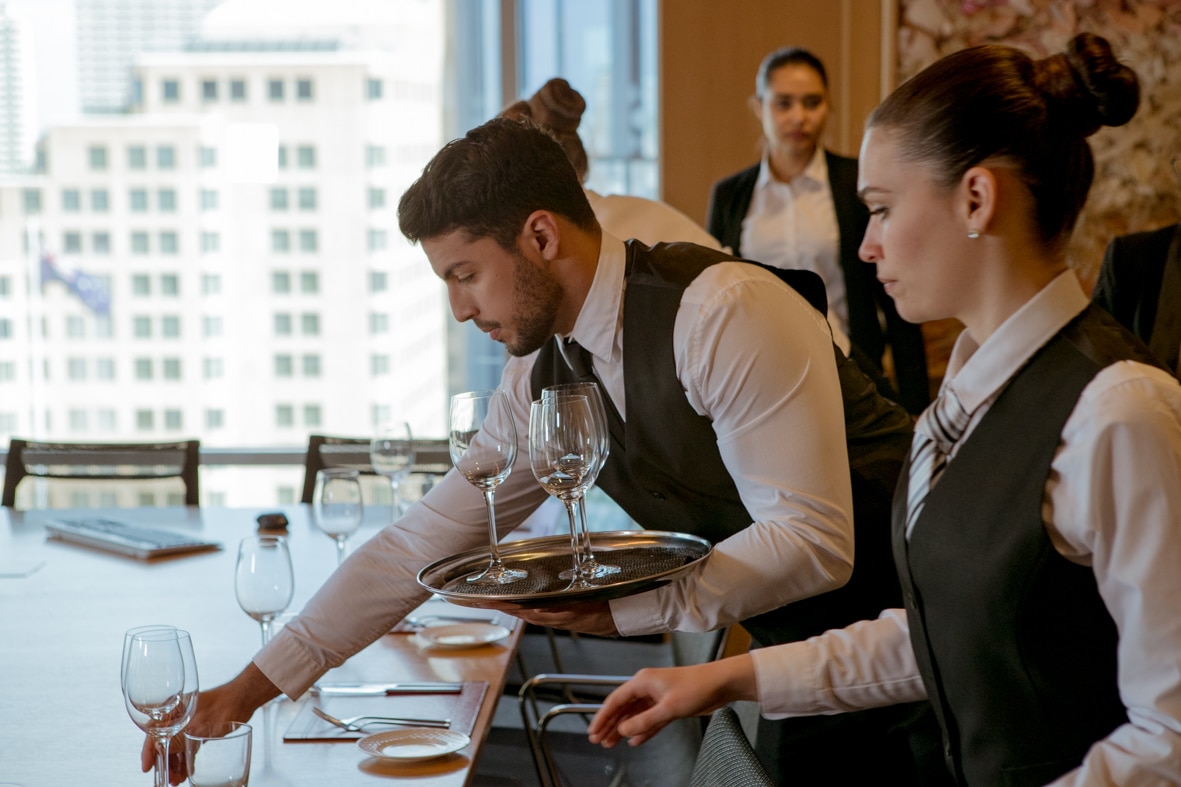Corporate Hospitality – The Brave New World
December 10th, 2019
1. Inhouse corporate hospitality
The fine art of inhouse corporate hospitality continues to climb new heights with some of Sydney’s biggest players leading the way. When many of Sydney’s corporate elite moved into Barangaroo in 2015/2016 new benchmarks were set with office fit outs in the three International Towers boasting extensive state of the art meeting, boardroom and events facilities serviced by custom designed commercial kitchens and dedicated pantries.
As the trend moves away from the ostentatious external corporate entertaining of times gone by, the budget focus has shifted to internal hospitality offerings with this spend becoming increasingly more important for corporations from both a client and staff perspective.
Boardroom corporate hospitality services are a way for the organisation to show appreciation to their employees and clients while providing a comfortable environment in which to conduct business.
What could be better than starting a meeting with the meeting room properly set up and ready for employees and clients? The boardroom attendant will also ensure that the guests are welcomed and have everything they need throughout the meeting.
In house hospitality services do not end with the setup of meeting rooms.
Geared to please both internal and external stakeholders, service offerings range from busy corporate cafes producing 1000 plus coffees per day to a la carte fine dining service featuring food by hatted chefs. The employers of choice are those that offer not just flexible work arrangements, but free coffee and the availability of good quality meals with corporate hospitality being high up on the list of perks that attract employees and assist with employee retention.
2. Key Responsibility of Corporate Hospitality Managers: Effective Staffing Strategies for Success
So how do companies staff these operations successfully? The industry is facing several challenges. The trend towards the agile working environment and flexible work hours brings new challenges for rostering and staffing ratios. Coupled with this, large firms are extending the hot desk idea to the suburbs, decentralising to labour force hotspots such as Sydney’s Western Suburbs. Areas such as Parramatta, where economic growth is expected to double over the next 5 years and real estate does not have the same high price tag as the city centre, are becoming increasingly popular.
On top of this, the range of catering and service required to power these hospitality operations are diverse and comprehensive, putting pressure on a labour market already experiencing shortages across high level hospitality skill sets. The demand for highly skilled chefs, baristas and boardroom waiters is ongoing and far less seasonal than the wider hospitality industry with corporate offices only slowing during school holiday periods and the Christmas break.
Another challenge is to optimise the operation of the boardroom services.
Managers must identify solutions to improve service quality while lowering operational costs in order to maximise performance and exceed industry benchmarks in the operation of boardroom services.
3. How do corporate hospitality managers overcome these challenges in order to maximise team’s performance?
It seems that flexibility is one of the key ingredients. The ability to tap into a flexible workforce, sourced from an ever-widening area, is paramount to overcoming the challenges of a widely fluctuating roster. The rise of the gig economy has helped, with more people choosing to take on a variety of roles over the working week to achieve financial security. Corporate hospitality managers are also relying more and more on agency staff, such as Clifford Wallace Agency, to achieve this flexibility, taking pressure off rosters and easing payroll related expenditure.
Clifford Wallace is essentially where you can find in-house hospitality staff because specialised agencies have the expertise and resources needed to provide the high level of service demanded by corporate hospitality managers.
With higher level hospitality skills in great demand, being able to source staff who have access to ongoing training will also assist in overcoming shortages. Supplying diversified hospitality training inhouse when it’s not your core business is neither practical nor cost effective. A full-service staffing agency can provide the solution, particularly if they offer bespoke options which Clifford Wallace Agency does.
Clifford Wallace Agency’s dedicated trainers provide in-house and on-the-job staff training five days a week. With this consistent, quality boardroom training, high achievers can be identified, ensuring we are prepared for all client circumstances.
High-level hospitality personnel can deliver outstanding service without breaking a sweat.
Clifford Wallace Agency’s corporate hospitality and training consultants evaluate and recommend solutions for all aspects of corporate hospitality operations, such as reception, concierge, and meeting room management.
With extensive experience developing and delivering bespoke training packages for boardroom teams a covering a wide range of hospitality skill sets are available.
As the inhouse corporate hospitality industry change continues to move forward at a rapid pace, agency staff will play a prominent role in overcoming logistical and budgetary issues. This is contributing to the ongoing professionalisation of the workforce, allowing managers to safely augment their inhouse staff with teams they can rely on to be work ready, capable and cost effective.
Back to Blog
Error: No feed with the ID 1 found.
Please go to the Instagram Feed settings page to create a feed.